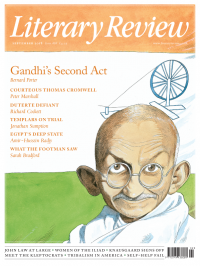Jude Cook
Lives in Motion
From a Low and Quiet Sea
By Donal Ryan
Doubleday 182pp £12.99
Trapped in small-town Ireland and bereft after a break-up, 23-year-old Lampy wonders how he might ‘tell his grandfather that he wanted to find a place where the measure of a man was different’. This yearning for a notional elsewhere and the keenly topical subject of migration are at the heart of Donal Ryan’s Booker Prize-longlisted fourth novel, From a Low and Quiet Sea, which contrasts Lampy’s experiences with those of two other male figures, before bringing them together expertly at the end. It is tighter than Ryan’s Faulknerian first novel, The Spinning Heart: every image here – from religious iconography to the sea itself – is set to work in an intricate plot that carries real emotional heft.
The first voice belongs to Farouk, a Syrian doctor who reluctantly decides he must take his family to what he hopes will be a safe haven in Europe. He tells his daughter that the sound of nearby gunfire is ‘the noise of a great machine that was being used to frighten birds away from crops’. Every day, he resists the forces of ISIS, who threaten to take over his hospital. Finally, he meets a people trafficker, ‘this dealer in flesh’, and sets a date for his departure. But he soon discovers he’s been conned: ‘There are no lifejackets on this boat. There is no captain. There is no crew. There is nothing on this boat but us.’ Farouk’s plight is richly imagined and wholly convincing. While his fate and those of his wife and daughter hang in the balance, the reader yearns to find out what happens next.
From here, the narrative travels to Ireland, the prose reverting to the paratactic mode that’s become Ryan’s trademark (‘And he’d feel himself getting cross with her and he wouldn’t answer her and he’d swear beneath his breath…’). It’s the perfect medium in which to render Lampy’s urgent, thwarted desires and

Sign Up to our newsletter
Receive free articles, highlights from the archive, news, details of prizes, and much more.@Lit_Review
Follow Literary Review on Twitter
Twitter Feed
The latest volume of T S Eliot’s letters, covering 1942–44, reveals a constant stream of correspondence. By contrast, his poetic output was negligible.
Robert Crawford ponders if Eliot the poet was beginning to be left behind.
Robert Crawford - Advice to Poets
Robert Crawford: Advice to Poets - The Letters of T S Eliot, Volume 10: 1942–1944 by Valerie Eliot & John Haffenden (edd)
literaryreview.co.uk
What a treat to see CLODIA @Lit_Review this holiday!
"[Boin] has succeeded in embedding Clodia in a much less hostile environment than the one in which she found herself in Ciceronian Rome. She emerges as intelligent, lively, decisive and strong-willed.”
Daisy Dunn - O, Lesbia!
Daisy Dunn: O, Lesbia! - Clodia of Rome: Champion of the Republic by Douglas Boin
literaryreview.co.uk
‘A fascinating mixture of travelogue, micro-history and personal reflection.’
Read the review of @Civil_War_Spain’s Travels Through the Spanish Civil War in @Lit_Review👇
John Foot - Grave Matters
John Foot: Grave Matters - Travels Through the Spanish Civil War by Nick Lloyd; El Generalísimo: Franco – Power...
literaryreview.co.uk